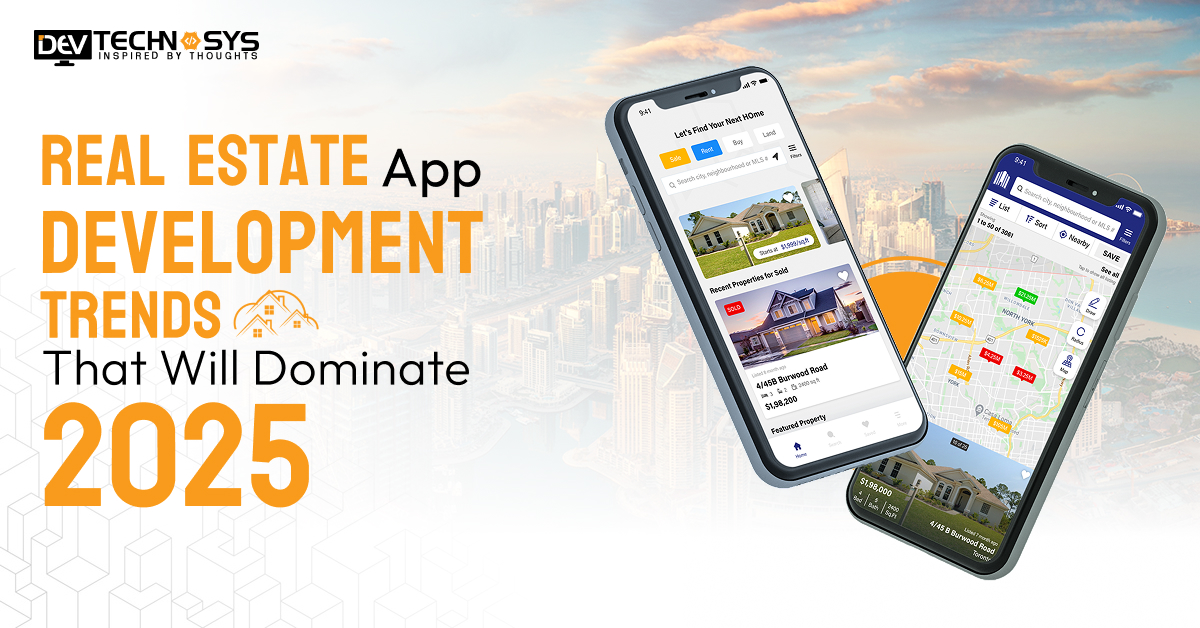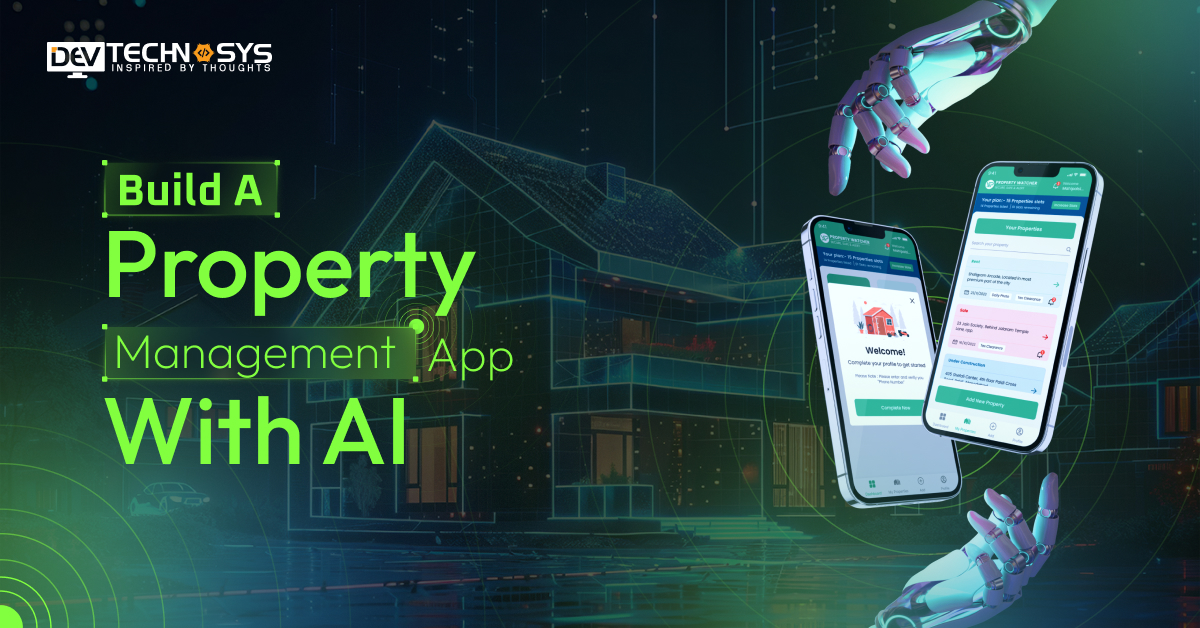“AI Finds Your Home”
In today’s world, technologies are growing very fast, and everyone wants to implement those technologies in their industry or sector.
The real estate sector is going through a digital revolution, and 2025 is expected to bring with it a slew of cutting-edge trends in app development that will change the way we purchase, sell, and engage with real estate.
From AI-powered property recommendations to virtual home tours and blockchain-backed transactions, these advancements promise to enhance user experience, increase transparency, and streamline the entire real estate journey.
Let’s get ready to explore the real estate development trends that will dominate 2025 and other related information.
Stay on!
Market Outlook of Real Estate Applications
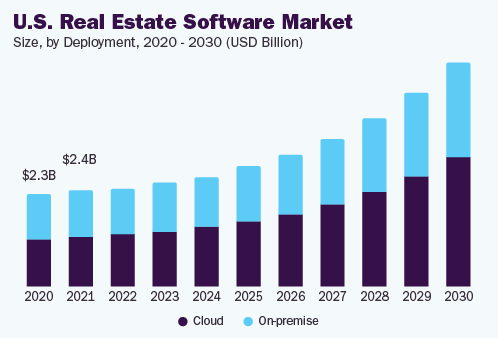
- The real estate industry in the United States is predicted to reach a whopping US$136.62 trillion by 2025.
- Among the major segments, Residential Real Estate is expected to lead with a market volume of US$110.83 trillion in the same year.
- Looking ahead, the market is expected to develop at a stable annual pace of 3.31% (CAGR 2025-2029), with a market volume of US$155.60 trillion by 2029.
- It is worth mentioning that, in terms of worldwide comparison, the United States is expected to create the most value in the Real Estate sector, with an anticipated value of US$136.6 trillion by 2025.
- In the US real estate market, the trend toward remote employment is increasing demand for suburban real estate.
Top Real Estate App Development Trends for 2025
Discover the top real estate application development trends for 2025, from AI-driven recommendations to blockchain-based transactions, that are reshaping property buying, selling, and management in the digital age.
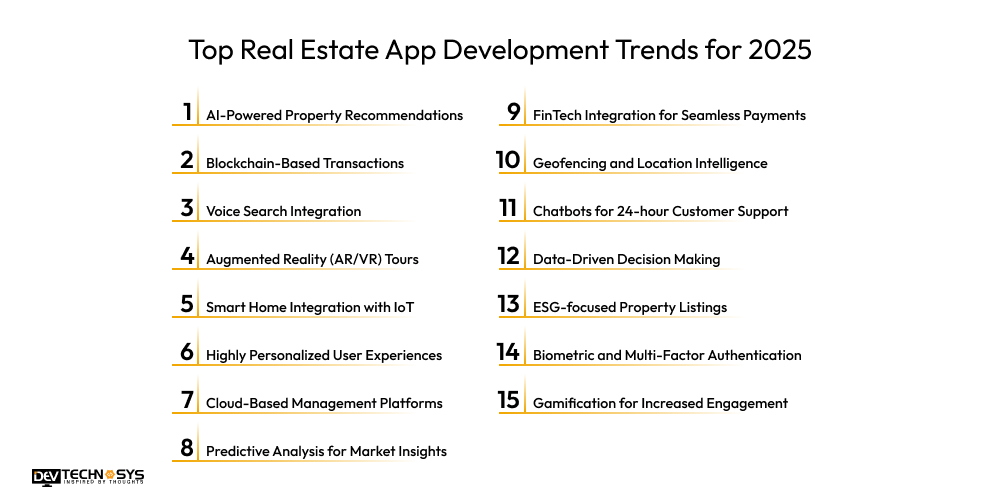
1. AI-Powered Property Recommendations
Artificial intelligence will take over real estate applications in 2025 by providing hyper-personalized property recommendations based on customer preferences, search history, budget, and behavior.
Hire app developers to integrate smart solutions improve decision-making and user pleasure by displaying the most relevant listings, saving browsing time, and improving interaction. AI may also help agents prioritize high-intent inquiries and automate repetitive processes to increase efficiency.
- Personalized property suggestions
- Dynamic sorting/filtering
- AI-generated investment insights
2. Blockchain-Based Transactions
Blockchain provides openness, security, and efficiency into real estate transactions. Smart contracts may streamline the agreement process, decrease paperwork, and avoid fraud. Blockchain technology provides safe data sharing, asset tokenization, and immutable property records.
As digital transactions grow more prevalent, blockchain integration in real estate apps will provide a tamper-proof system that fosters confidence and expedites the purchasing or renting process.
- Smart contract execution
- Tamper-proof digital property records
- Crypto wallet integration
3. Voice Search Integration
Voice technology is becoming a crucial component of mobile apps. Real estate applications that support voice search enable users to discover homes hands-free, providing convenience and speedier navigation.
This function is very useful for mobile users or those who require accessibility. Voice search’s accuracy and contextual comprehension will improve by 2025, resulting in broad implementation on real estate platforms.
- Voice-enabled property search
- Natural language processing
- Multi-language voice support
4. Augmented Reality (AR/VR) Tours
AR and VR technology are altering the way people see properties. Users may virtually tour whole homes using 3D walkthroughs, saving time and removing the need for in-person visits. An app like Dubai REST provide a realistic sense, increasing consumer confidence and curiosity.
In 2025, more real estate applications will use AR/VR to lure remote buyers and deliver an upgraded and interactive user experience.
- 3D virtual walkthroughs of properties
- VR headset compatibility
- Virtual staging for unfurnished listings
5. Smart Home Integration with IoT
The Internet of Things (IoT) allows for real-time communication between apps and smart home gadgets. The software allows users to check lighting, temperature, security, and energy efficiency.
This helps home buyers have a better grasp of smart features before making a selection. In 2025, real estate apps will progressively feature IoT integration to fulfill the need for tech-enabled living environments.
- Live data feed from smart meters
- Remote control of lighting
- Display smart home compatibility
6. Highly Personalized User Experiences
To customize the experience, contemporary real estate apps like Bayut employ machine learning algorithms. These applications provide personalized information, property recommendations, and notifications depending on user activity.
In 2025, hyper-personalization will extend beyond property listings to include dynamic interfaces, interactive maps, customized chat assistance, and investment suggestions. In addition to improving engagement, this enables customers to make quicker and better-informed decisions.
- AI-powered content and blog suggestions
- Personalized home screen
- Smart search history
7. Cloud-Based Management Platforms
Cloud computing allows for scalability, data backup, and real-time multi-user access. Real estate apps will increasingly rely on cloud-based systems for CRM, property listings, client data, and collaboration features.
In 2025, cloud integration will improve performance, protect data, and allow agents to operate from anywhere. It also offers seamless synchronization across many devices and users, which improves property management efficiency.
- Real-time syncing across devices
- Automatic data backup
- Cloud-hosted CRM
8. Predictive Analysis for Market Insights
A real estate app like Aqar will utilize predictive analytics to estimate property prices, rental trends, and investment opportunities. Apps that analyze user data, market trends, and economic indicators can give insights that assist buyers, investors, and brokers make better decisions.
Predictive technologies will become commonplace by 2025, transforming data into actionable tactics and giving agents a competitive advantage in a volatile real estate marketplace.
- Forecasts for property price appreciation
- Risk scoring for investments
- AI-driven rent vs. buy analysis
9. FinTech Integration for Seamless Payments
Real estate apps in 2025 will include FinTech elements such as mortgage calculators, EMI estimators, loan applications, and digital payment choices. These features help users simplify difficult financial procedures by allowing them to perform rapid computations, secure transactions, and even loan approvals straight within the app.
FinTech integration allows consumers to manage their budgets more efficiently and removes the need for external financial instruments during property purchases.
- Built-in mortgage and EMI calculators
- Pre-approval tools for home loans
- Credit scoring and loan eligibility checks
10. Geofencing and Location Intelligence
Geo-fencing employs GPS to provide real-time alerts about nearby properties, open houses, and local market trends. Users receive hyper-local notifications when they enter specified regions, which aids in property finding.
If you develop a real estate mobile app for UAE, it will integrate location intelligence to provide tailored suggestions, heatmaps of high-demand zones, and insights into local amenities, school ratings, and commute times.
- Interactive neighborhood maps
- Listings based on proximity to user’s current location
- Localized push notifications for events
11. Chatbots for 24-hour Customer Support
AI-powered chatbots are becoming increasingly common in real estate apps, offering rapid replies, property recommendations, and lead validation. These bots can handle many questions at the same time and are accessible around the clock.
By 2025, chatbots will be more conversational and context-aware, able to handle complicated inquiries, schedule visits, and even negotiate transactions, providing consumers with seamless service while lowering human effort.
- Instant property recommendations
- Intelligent FAQ and knowledge base
- Multi-language conversational support
12. Data-Driven Decision Making
Real estate apps will increasingly rely on data analytics to inform choices at all levels. From buyer behavior to market trends and price strategy, applications will provide dashboards and visual insights to agents and users.
By 2025, data will dictate app features, marketing tactics, and investment planning, making analytics a necessary aspect for all successful real estate platforms.
- Market trend analytics and graphs
- Visual dashboards for property comparisons
- Buyer and seller behavior insights
13. ESG-focused Property Listings
Environmental, social, and governance (ESG) considerations are increasingly crucial to property purchasers and investors. Real estate applications will emphasize environmentally friendly housing, sustainable construction, and energy efficiency ratings.
By 2025, users will be able to filter properties by green certifications, solar readiness, and carbon footprint, making ESG-focused searches a valuable selling feature in a climate-conscious real estate market.
To meet this growing demand, it’s essential to create real estate management platform in Middle East that prioritizes ESG integration and sustainable property features.
- Filters for eco-friendly certifications
- Sustainability score or badge on listings
- Carbon footprint tracking
14. Biometric and Multi-Factor Authentication
Security is essential in real estate transactions. Apps will safeguard user data and payments with biometric logins (fingerprint, face recognition) and multi-factor authentication by 2025.
These characteristics promote trust, prevent illegal access, and adhere to privacy standards. As cyber risks increase, robust authentication mechanisms will become the standard in all high-performing real estate systems.
- Face recognition or fingerprint login
- OTP-based verification
- Session timeout and re-authentication prompts
15. Gamification for Increased Engagement
Gamification features such as incentive points, interactive quizzes, and virtual achievements will make real estate apps more interesting. These features can help consumers understand the purchasing process, encourage app usage, and reward loyalty.
By 2025, more applications will employ gamification to keep users engaged, enhance session length, and make the property search experience pleasurable and memorable. Partnering with a top mobile app development company in UAE can help integrate such gamification elements effectively into your real estate application.
- User rewards for app activity
- Progress bars for the search or buying journey
- Daily property quiz or trivia
Key Features Future-Ready Real Estate Apps Must Have
Explore the must-have features for future-ready real estate apps, from AI-powered search to virtual tours, that will enhance user experience, streamline operations, and drive success in 2025 and beyond.
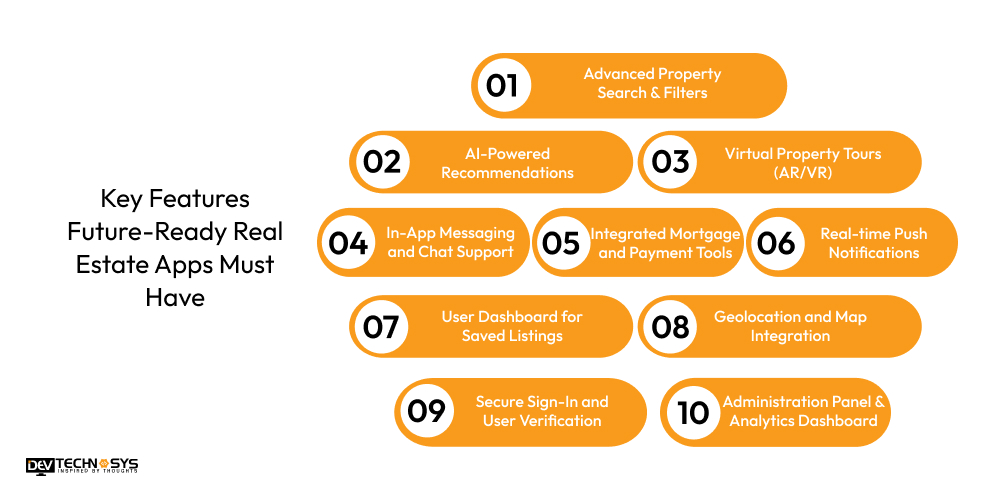
1. Advanced Property Search & Filters
Give guests the option to search by a number of criteria, such as property type, amenities, location, cost, and size. Add features like map-based search, neighborhood insights, and school zone filters to improve the user experience.
2. AI-Powered Recommendations
Use AI to assess user preferences and browsing behavior and recommend related properties. These clever suggestions help consumers locate their dream property faster, increasing happiness and retention.
3. Virtual Property Tours (AR/VR)
Create engaging 360-degree property tours using augmented or virtual reality. This tool enables users to see houses remotely, saving time and enticing long-distance purchasers and renters.
4. In-App Messaging and Chat Support
Facilitate real-time communication among buyers, sellers, agents, and support staff. Integrate AI chatbots for immediate replies and live chat for more complicated inquiries.
5. Integrated Mortgage and Payment Tools
Real estate app development solutions in Dubai provide resources such as mortgage calculators, EMI estimators, loan pre-approval, and digital payment choices.
6. Real-time Push Notifications
Keep users updated on new listings, price changes, planned tours, and specials. Personalized, timely alerts boost engagement and conversions.
7. User Dashboard for Saved Listings
Provide consumers with a personalized dashboard to manage preferred properties, planned visits, saved searches, and communication history. This improves ease and promotes app usage.
8. Geolocation and Map Integration
Show properties on interactive maps that include real-time location tracking. Highlight local amenities, public transportation, traffic, and area information to help you make an informed decision.
9. Secure Sign-In and User Verification
Implement biometric logins (fingerprint/face ID), two-factor authentication, and secure user data storage to safeguard sensitive information and ensure compliance with data privacy standards.
10. Administration Panel & Analytics Dashboard
Provide property managers and agents with a backend dashboard to manage listings, leads, user activity statistics, marketing campaigns, and overall performance tracking in real time.
Challenges in Real Estate App Development
Discover the major challenges in real estate app development, from data integration to regulatory compliance, and learn how to overcome them for building secure, scalable, and user-centric property platforms.
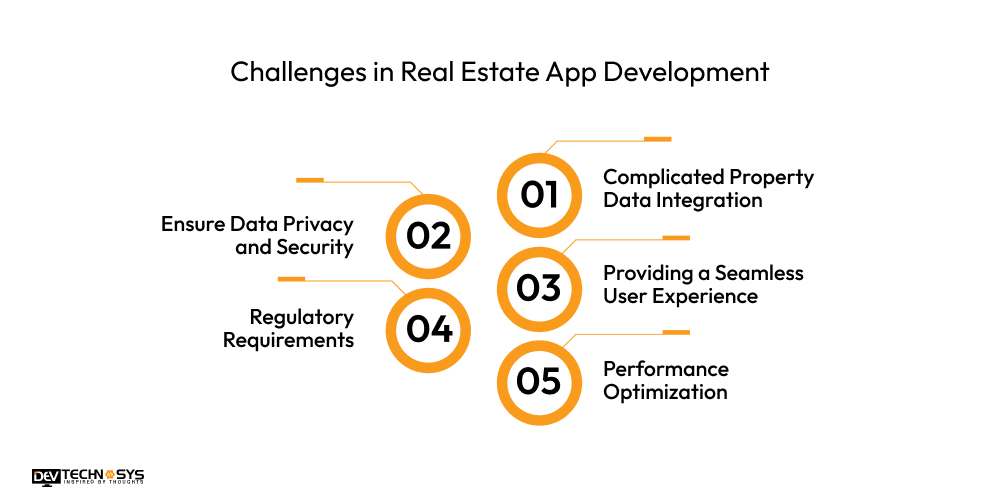
1. Complicated Property Data Integration
Integrating data from several sources, such as MLS, CRM systems, and third-party APIs, can be problematic. Ensuring precise, real-time synchronization while retaining data quality and structure is critical. Poor integration results in outdated listings, faulty functionality, and a subpar user experience.
2. Ensure Data Privacy and Security
The real estate Android app development solution in Dubai handles private user data, including financial and personal data. Developers of real estate apps are required to follow data protection regulations like GDPR and employ strong encryption and secure authentication. Any security violation may erode confidence and result in legal ramifications, making security a key development concern.
3. Providing a Seamless User Experience
Developing a simple, user-friendly design that caters to several user roles—buyers, sellers, and agents—is difficult. Ensuring quick load times, adaptable design, and device accessibility necessitates careful planning and testing, especially when customers demand a seamless, app-like experience throughout their property search trip.
4. Regulatory Requirements
Real estate is tightly regulated, with rules varying by location and country. Developers must verify that the app meets the licensing, advertising, and disclosure standards. Noncompliance can lead to fines or app removal from markets; thus, legal due diligence is critical throughout design and development.
5. Performance Optimization
As user numbers and property listings expand, applications must handle the additional demand without sacrificing speed. Developers must provide scalable backend infrastructure and improve APIs to ensure performance and stability. Poor scalability can result in crashes, delayed replies, and an unsatisfactory experience for both users and agents.
Future-Proofing of Real Estate Applications
Explore essential strategies for future-proofing real estate applications, from adopting emerging technologies to ensuring scalability, cross-platform compatibility, and data security—empowering your app to stay competitive, adaptable, and relevant in an ever-evolving digital property landscape.
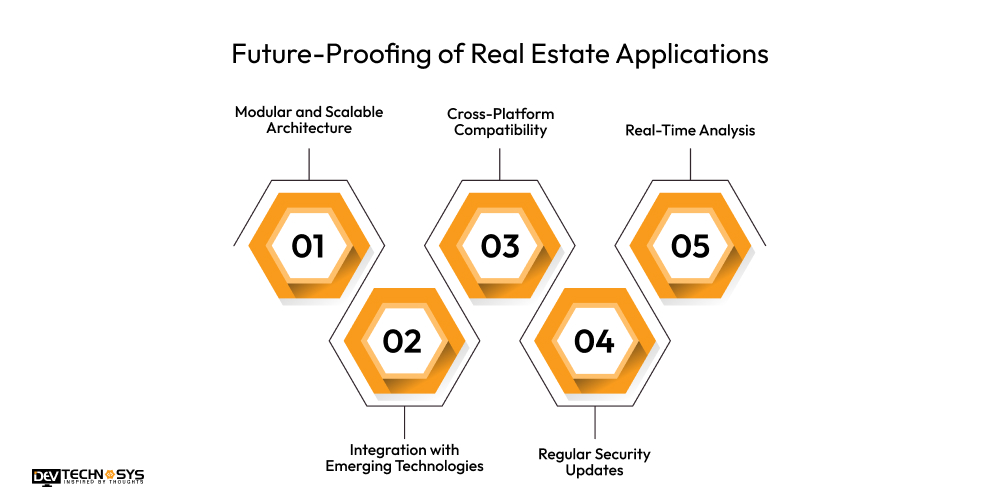
1. Modular and Scalable Architecture
Create real estate app, which will allow for quick modifications and scaling. This technique assures that the program can manage future feature improvements, increasing user loads, and new integrations without needing a total redesign or breaking present functionality.
2. Integration with Emerging Technologies
Adopt upcoming technologies like as AI, AR/VR, IoT, and blockchain to help your app stay relevant in the future. These improvements not only improve the user experience, but also keep your platform competitive as technology trends change and customer expectations rise in the dynamic real estate industry.
3. Cross-Platform Compatibility
Ensure that the app functions effectively on all platforms, including iOS, Android, web, and tablets. Real estate app development services in UAE provide faster updates, consistent performance, and a greater reach, making your app more adaptable to future devices and operating system improvements.
4. Regular Security Updates
Implement rigorous security policies that include regular upgrades to address emerging vulnerabilities. Maintain compliance with growing data protection requirements, such as GDPR and CCPA. This increases user confidence and makes your software legally sound as cyber threats and laws get more complicated.
5. Real-Time Analysis
Use real-time analytics and user feedback tools to track performance and behavior. This data-driven strategy enables continual iOS app development in UAE, faster issue resolution, and informed decisions that fit your app with changing market demands and user preferences.
Conclusion
In conclusion, the future of real estate app ideas looks exciting with smart features like AI, virtual tours, and voice search. These trends will make buying and selling homes much easier and faster. If you want to build a great app with all these cool tools, you should work with a real estate app development company. They know how to make apps that are up to date, secure, and entertaining. Real estate is changing fast, and good apps will help everyone find their dream home more easily.
Frequently Asked Questions
1. What Are the Top Real Estate App Development Trends in 2025?
Top real estate mobile app development trends in 2025 include AI-powered recommendations, AR/VR tours, blockchain transactions, voice search, IoT integration, fintech tools, geolocation features, and ESG-focused listings, transforming how users buy, sell, and explore properties.
2. How Will AR and VR Change Real Estate Apps in 2025?
In 2025, AR and VR will transform real estate apps by offering immersive virtual tours, interactive 3D property views, and remote walkthroughs, helping users explore properties in detail without visiting them physically.
3. Are Real Estate Apps Using Fintech Tools in 2025?
Yes, real estate apps in 2025 are increasingly using fintech tools like mortgage calculators, digital payments, loan pre-approvals, and credit checks to streamline financial processes and offer users a seamless, end-to-end property transaction experience.
4. Why is Location Intelligence Important in Real Estate Apps?
Location intelligence is vital in real estate apps as it provides users with data-driven insights on neighborhoods, nearby amenities, schools, and pricing trends, helping them make smarter, more informed decisions when buying, renting, or investing in properties.
5. What Are ESG-Focused Listings in Real Estate Apps?
ESG-focused listings in real estate apps highlight properties that meet environmental, social, and governance standards, such as energy efficiency, sustainable materials, and ethical development, appealing to eco-conscious buyers and promoting responsible, future-oriented property investments.



